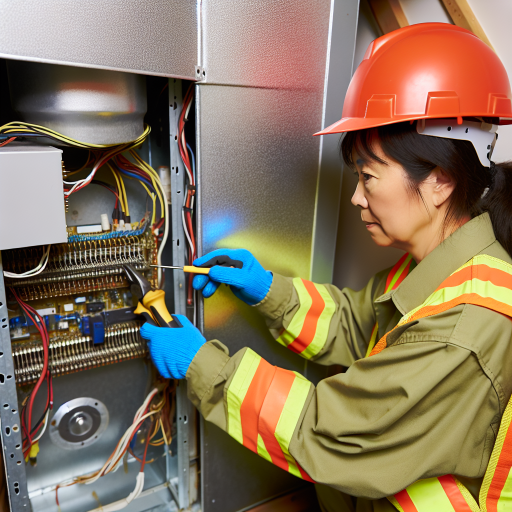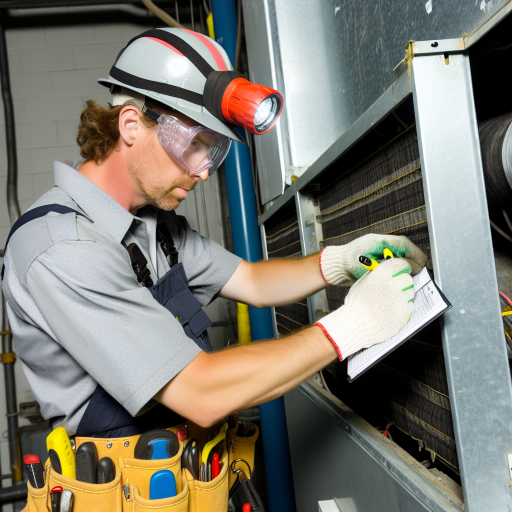Current Trends in HVAC Technology
Energy Efficiency Innovations
Energy efficiency remains a top priority in HVAC technology.
Systems now feature advanced variable speed technology.
Additionally, smart thermostats enable precise control of energy use.
These innovations lower energy costs and reduce environmental impacts.
Smart HVAC Systems
Smart HVAC systems are transforming the industry landscape.
IoT-enabled devices allow for remote monitoring and control.
They optimize performance based on real-time data analysis.
Homeowners enjoy increased comfort and energy savings.
Indoor Air Quality Improvements
Indoor air quality (IAQ) has gained significant attention recently.
Advanced filtration systems capture more allergens and pollutants.
HVAC technology now includes sensors to monitor air quality in real time.
This improves health and comfort for building occupants.
Green Refrigerants
There is a shift towards environmentally friendly refrigerants.
Traditional substances with high global warming potential are being phased out.
Alternatives like hydrofluoroolefins (HFOs) are gaining popularity.
These solutions lessen the environmental impact of cooling systems.
Integration of Renewable Energy
HVAC technology increasingly integrates renewable energy sources.
Solar panels complement traditional HVAC systems effectively.
Hybrid systems can use energy from the sun or the grid as needed.
This approach enhances sustainability and reduces dependency on fossil fuels.
Smart Building Technologies
Smart buildings incorporate advanced HVAC systems seamlessly.
Integration with Building Management Systems (BMS) improves efficiency.
This technology enables centralized control of various building systems.
Ultimately, it enhances operational performance and occupant comfort.
The Role of Smart Thermostats in Enhancing Energy Efficiency
Introduction to Smart Thermostats
Smart thermostats offer advanced features for managing home climate control.
Unlock Your Career Potential
Visualize a clear path to success with our tailored Career Consulting service. Personalized insights in just 1-3 days.
Get StartedThey provide real-time data and insights for homeowners.
Furthermore, they allow remote access via smartphone apps.
Energy Monitoring and Adaptive Learning
One significant benefit is energy monitoring.
This feature helps users track energy consumption patterns.
Moreover, smart thermostats adapt to user preferences.
They learn from the routines and habits of the household.
This intelligent behavior leads to optimized energy usage.
Integration with Home Automation Systems
Smart thermostats easily integrate with home automation systems.
This connectivity enhances the overall efficiency of HVAC systems.
Users can coordinate heating and cooling with other smart devices.
For instance, they can sync with smart lighting for energy savings.
This synergy creates a more efficient home environment.
Cost Savings and Return on Investment
Investing in a smart thermostat can yield significant cost savings.
These devices reduce energy bills by optimizing consumption.
Additionally, many utility companies offer rebates for installation.
Over time, these savings provide a strong return on investment.
Case Studies of Successful Implementation
Many homeowners report increased comfort and savings.
A family in Denver saved 30% on their energy bills after installation.
Similarly, an apartment complex in Austin achieved higher tenant satisfaction.
Residents appreciated the convenience of smart climate control.
Future Trends in Smart Thermostats
The future of smart thermostats looks promising.
Emerging trends include AI-driven optimization.
Additionally, increased compatibility with renewable energy sources is expected.
As technology advances, features will become even more sophisticated.
Smart thermostats will play a crucial role in sustainable living.
Exploring the Integration of IoT in HVAC Systems and Its Benefits
Overview of IoT in HVAC
The Internet of Things (IoT) transforms HVAC systems into smart technologies.
It connects devices, allowing them to communicate data effectively.
This integration enhances operational efficiency significantly.
Moreover, it provides real-time monitoring and control.
Benefits of IoT-Enabled HVAC
Smart HVAC systems offer numerous advantages for users.
First, they enhance energy efficiency and cost savings.
According to Mark Thompson from EcoTech, energy consumption can drop by 30%.
Second, they improve indoor air quality significantly.
This technology allows for monitoring of air quality metrics.
Real-Time Data and Automation
Real-time data collection is a crucial feature of IoT-enabled systems.
Users can receive alerts on system performance and maintenance needs.
Additionally, automation simplifies user interactions.
This feature adjusts settings based on occupancy and external conditions.
As a result, users experience increased comfort and convenience.
Security and Privacy Considerations
While IoT brings many benefits, security concerns are prevalent.
Protecting sensitive data must be a priority for manufacturers.
Strong encryption protocols can help safeguard user information.
Furthermore, continuous software updates are essential for security.
Future Trends in IoT and HVAC Integration
The future of HVAC technology looks promising with IoT.
Anticipated advancements include more robust predictive maintenance tools.
These tools will utilize AI to forecast system failures.
Additionally, integration with renewable energy sources will enhance efficiency.
Ultimately, this evolution supports smarter, greener building management.
Discover More: Challenges and Rewards in the Metal Fabrication Industry
Sustainable HVAC Solutions: The Shift Towards Eco-Friendly Technologies
Understanding Sustainable HVAC Systems
Sustainable HVAC systems prioritize energy efficiency and reduced environmental impact.
They incorporate renewable energy sources and smart technology.
This approach not only benefits the environment but also reduces operational costs.
Key Innovations in Sustainable HVAC
Advanced heat pumps have gained popularity in modern HVAC systems.
They provide heating and cooling solutions with lower energy consumption.
Furthermore, variable refrigerant flow systems optimize energy use based on demand.
The Role of Smart Technology
Smart thermostats enhance energy management in HVAC systems.
These devices learn user preferences and adjust settings automatically.
Consequently, they contribute to lower energy bills and carbon footprints.
Impact of Eco-Friendly Technologies on the Market
The demand for sustainable HVAC solutions continues to grow.
More consumers are prioritizing energy-efficient products during their purchases.
As a result, manufacturers are investing in research and development for greener technologies.
Regulatory Changes and Sustainability Standards
Government regulations are becoming more stringent regarding HVAC efficiency.
New standards encourage the adoption of eco-friendly solutions.
Compliance with these regulations often leads to financial incentives for businesses.
Benefits of Switching to Sustainable HVAC
- Lower energy costs through enhanced efficiency.
- Increased property value due to modern, eco-friendly systems.
- Improved indoor air quality for healthier living spaces.
Shifting to sustainable HVAC technologies creates a win-win situation for both consumers and the planet.
Gain More Insights: Exploring Different Materials Used in Upholstery Work
The Impact of HVAC Technology on Indoor Air Quality and Health
Enhancing Indoor Air Quality
Modern HVAC technology significantly improves indoor air quality.
Advanced filtration systems capture harmful pollutants effectively.
They reduce allergens such as dust, pollen, and pet dander.
Consequently, these systems contribute to healthier living environments.
Promoting Healthier Spaces
Indoor air quality directly impacts occupants’ health.
Low-quality air can result in respiratory issues and allergies.
Conversely, improved ventilation reduces the risk of airborne diseases.
For instance, systems with enhanced airflow minimize virus transmission.
Energy Efficiency and Health
Energy-efficient HVAC systems also contribute to health benefits.
These systems utilize less energy, lowering emissions from power plants.
As a result, cleaner air quality extends beyond indoor spaces.
Moreover, efficient systems maintain stable temperatures and humidity levels.
This stability prevents mold growth, which can harm health.
Smart HVAC Solutions
Smart HVAC technology enables better control over indoor environments.
Smart thermostats adjust settings based on occupancy patterns.
This innovation helps optimize energy use without sacrificing comfort.
Furthermore, real-time air quality monitoring can alert occupants to issues.
Integrating with Health Initiatives
Healthy homes are a growing focus for builders and developers.
Integrating HVAC systems with health initiatives enhances their benefits.
This collaboration fosters environments that promote well-being.
For example, schools equipped with advanced HVAC systems support better student performance.
People thrive in spaces where air quality and comfort are prioritized.
Delve into the Subject: The Rise of Smart Construction: How Technology is Changing Trade Jobs in Canada

Future Predictions: How AI and Machine Learning Will Transform HVAC Operations
Advancements in Predictive Maintenance
AI-driven predictive maintenance will revolutionize HVAC systems.
This technology anticipates failures before they occur.
As a result, it minimizes downtime and lowers repair costs.
Companies like ClimateTech Innovations lead in this field.
They utilize data analytics to forecast equipment issues.
This proactive approach extends the lifespan of HVAC units.
Enhanced Energy Efficiency
Machine learning algorithms optimize energy consumption in real-time.
These systems adapt to changing conditions automatically.
Smart thermostats like EcoSmart are great examples.
They learn user preferences to maintain comfort efficiently.
This reduction in energy use directly impacts operating costs.
Furthermore, it supports sustainability initiatives.
Improved Indoor Air Quality
AI technologies enhance the monitoring of indoor air quality.
They provide timely alerts regarding air pollutants.
For instance, air quality sensors integrated with HVAC systems ensure safety.
Additionally, AI helps regulate ventilation automatically.
This leads to healthier indoor environments for occupants.
Seamless Integration of Smart Home Technology
Future HVAC systems will seamlessly integrate with smart home devices.
This connectivity allows for centralized control of heating and cooling.
Consumers will enjoy increased convenience and comfort.
Smart home ecosystems, such as Google Home, exemplify this trend.
Such integrations improve user experience significantly.
Data-Driven Decision Making
Machine learning provides valuable insights from HVAC data.
This enables better strategic planning and operational decisions.
Companies can analyze usage patterns to enhance efficiency.
Data visualization tools create comprehensive reports for management.
Consequently, organizations adapt to trends quickly.
Challenges and Considerations
Despite benefits, implementing AI in HVAC poses challenges.
Data security and privacy are major concerns for companies.
Furthermore, workforce training becomes essential for success.
Organizations must invest in educating employees on using AI tools.
Addressing these challenges ensures smoother transitions.
Learn More: Understanding Welding Skills for Metal Fabricators
Understanding Renewable Energy Sources for HVAC Applications
Overview of Renewable Energy Sources
Renewable energy sources play a crucial role in the evolution of HVAC systems.
These sources include solar, wind, and geothermal energy.
Each source offers unique benefits and applications in HVAC technology.
Solar Energy in HVAC
Solar energy harnesses the power of the sun to heat and cool spaces.
Photovoltaic panels convert sunlight into electricity for HVAC systems.
Solar thermal systems provide hot water for heating applications.
This approach reduces reliance on fossil fuels and lowers utility bills.
Wind Energy for HVAC Systems
Wind energy utilizes turbines to generate electricity for residential and commercial use.
It complements other renewable sources, enhancing overall energy efficiency.
Wind-powered HVAC systems can achieve significant energy savings.
These systems contribute to a reduction in greenhouse gas emissions.
Geothermal Energy Applications
Geothermal energy taps into the earth’s natural heat for heating and cooling.
Geothermal heat pumps transfer heat to and from the ground.
This technology provides consistent, energy-efficient temperature regulation.
Geothermal systems result in lower operating costs over time.
Benefits of Using Renewable Energy in HVAC
Integrating renewable energy into HVAC systems offers numerous advantages.
- Reduction in energy costs due to decreased dependence on traditional energy sources.
- Enhanced sustainability practices that support environmental conservation.
- Improved energy efficiency that results in lower operational expenses.
- Increased property value through the implementation of green technologies.
Challenges of Implementing Renewable HVAC Systems
Despite the benefits, challenges persist in adopting renewable energy in HVAC.
High initial installation costs can deter potential users.
Furthermore, the availability of renewable resources varies by location.
Maintaining and servicing advanced systems can also require specialized skills.
The Importance of Regular Maintenance and Upgrades in HVAC Systems
Why Regular Maintenance Matters
Regular maintenance keeps HVAC systems running efficiently.
It prevents major breakdowns that can disrupt comfort.
Furthermore, routine checks enhance system longevity.
This process identifies potential issues early on.
Technicians can address these issues proactively.
Benefits of Upgrades
Upgrading HVAC systems improves energy efficiency.
Modern units consume less energy than older models.
Moreover, upgrades often come with advanced technology.
Smart thermostats optimize heating and cooling schedules.
This reduces unnecessary energy costs for homeowners.
Cost-Effectiveness of Maintenance
Investing in regular maintenance saves money over time.
Preventive care decreases the likelihood of expensive repairs.
In addition, efficient systems use less energy, lowering bills.
Reliable HVAC systems also boost property value.
Long-Term Benefits of HVAC Practices
Regular maintenance and upgrades are essential.
They enhance the efficiency and reliability of HVAC systems.
Investing in these practices leads to long-term benefits.
Additional Resources
Will Artificial Intelligence Affect Trade Workers? – The Beat by CBT …




